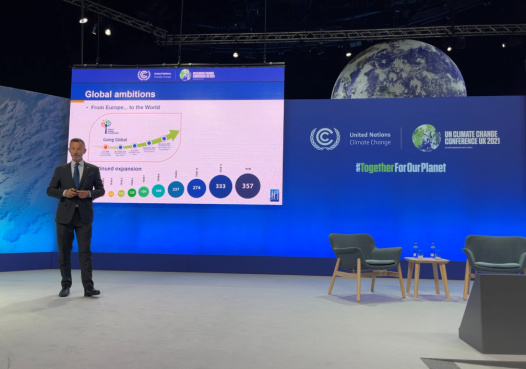Global airport industry showcases increased climate ambition at COP26

Italy’s Milan Linate Airport and Japan’s Kansai Airports Group achieve the highest levels of Airport Carbon Accreditation as ACI presents latest advances towards Net Zero CO2 on stage at COP26 in Glasgow
Glasgow – On the occasion of the COP26 side-event co-hosted by ACI World and ACI EUROPE1, the global airport industry marked progress towards Net Zero CO2. In particular, the highest levels of the worldwide carbon standard for airports, Airport Carbon Accreditation, were achieved by Italy’s Milan Linate Airport and three Japanese airports operated by Kansai Airports Group – Kansai International Airport, Osaka International Airport and Kobe Airport. The programme is recording a continuous upward trend in new airport entries, with the current total of 357 accredited airports. This clearly demonstrates that whilst the industry continues to grapple with the fallout from the COVID-19 crisis, with only a meagre recovery registered, its determination to pursue decarbonisation remains unchallenged.
Galvanised relationship with the UNFCCC
ACI’s Airport Carbon Accreditation programme has enjoyed a fruitful working cooperation with the United Nations Framework Convention on Climate Change secretariat starting from the historic COP21, and extending henceforth, based on their shared goal of promoting ambitious climate action. This long-standing relationship has once again been celebrated at at COP26 and the side-event led by ACI in the UN’s Climate Action Hub entitled: “Sustainable Connectivity? Meet the Net Zero airport of the future”.
Highlighting the importance of airport climate action, Niclas Sveningsen, Manager, Global Climate Action, UNFCCC said: “COP26 is a crucial stepping stone towards fully enabling the Paris Agreement. The contribution of real-life climate action towards Net Zero, such as ACI’s Airport Carbon Accreditation, is invaluable to support the realisation of the goals of the Paris Agreement and for the success of COP26. For several years now, even during the global Pandemic, I have seen ACI tirelessly moving forward by engaging, inspiring and evolving their support to climate action in airports. This is a good example of leadership.”
Transformation and Transition bringing airports closer to Net Zero
A year on from the addition of Level 4 Transformation and Level 4+ Transition to the Airport Carbon Accreditation framework, which marked a new dynamic in the ambition level of the programme, a number of airports across all world regions have risen to the challenge and achieved this highest currently available climate accolade. The obligations set forward by these certification levels include alignment of airports’ carbon reduction targets with the emissions pathways derived by the IPCC from the Paris Agreement objectives, submission of an extended carbon footprint, as well as providing proof of more effective and goal-oriented stakeholder engagement to promote carbon reduction across the entire airport ecosystem. The most recent upgrades to these levels were made by:
- Milan Linate Airport – Level 4+ ‘Transition’ SEA Airports, the operator of Milan Linate Airport, has defined and adopted a Net Zero CO2 target by 2030, accompanied by the Airport Carbon Accreditation certification upgrade, through the reduction of absolute emissions. Despite the devastating impact of the COVID-19 crisis, Milan Linate continued to invest in reducing the carbon intensity of its operations and those of its business partners. The airport has undertaken measures to improve efficiency of air conditioning and lighting, electrification of its vehicle fleet, as well as energy recovery. These actions have resulted in a 10% reduction of controlled emissions (scope 1 and 2) in 2019, as compared to the 3-year rolling average. Milan Linate’s actions don’t stop there and also target scope 3 emissions, with projects such as: supply of electrical ground power to aircraft on stand, promotion and facilitation of access to SAF for airline partners, partnering with the local municipality on the extension of a metro line to connect the airport to the city, carpooling for airport employees and support for ground handlers to electrify their ground vehicle fleets.
- Kansai Airports Group – Level 4 ‘Transformation’ The three airports operated by the Group are the first in Japan to receive Level 4, building on their track record as early movers in the programme (Kansai and Osaka airports became the first in Japan to join Airport Carbon Accreditation in 2016, with Kobe following suit in 2018). The Group is carrying out a wide range of environmental activities to enhance sustainability based on four key themes: Response to Climate Change, Resource Usage, Environmental Harmony and Environmental Management. The upgrade to Level 4 is a recognition of the group’s ongoing work in this field and its long-term commitment to Net Zero greenhouse gases, which has been adopted by the Airport Environmental Council gathering all airport stakeholders. The Group will continue to make efforts to reduce emissions hand in hand with its business partners, also by setting up a framework enabling environmentally minded businesses to participate in airport operations. All three airports are also committed to pursue environmental practices in harmony with the local communities they serve.

